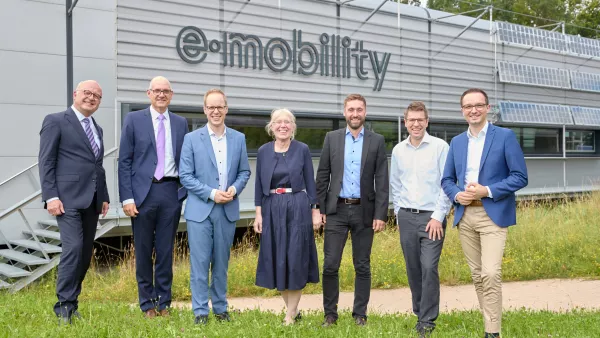
Weingarten - Two parliamentary state secretaries from the German government paid a visit to RWU. Benjamin Strasser from the Federal Ministry of Justice had a home game, so to speak, as he has represented the Ravensburg constituency in the Bundestag since 2017. He was accompanied by his FDP parliamentary colleague Dr. Jens Brandenburg, State Secretary at the Federal Ministry of Education and Research (BMBF).
At the start of the exchange between the political and academic worlds, the Rector, Professor Dr. Thomas Spägele, presented current developments at RWU. The further development of the degree program portfolio and the digital transformation of the university were discussed. However, the dominant topic for the following discussion was the design of the framework conditions for successful internationalization.
RWU focuses on internationalization in technology
At RWU, 16 percent of students currently come from abroad. This figure will continue to rise. For example, a new English-language Bachelor's degree course in Mechatronics is being launched. It is primarily the technical degree courses where RWU is focusing on internationalization. "After all, skilled workers are urgently needed by our industry, even if these subjects are currently not so popular among German school leavers," said Thomas Spägele.
RWU can also well imagine internationalization in nursing. "This is a socially highly relevant topic," said the Rector, "which we will not be able to solve with the demand for studies from Germany alone." The situation is similar with industrial teacher training. Three degree courses at RWU are both vocationally qualifying in their respective subjects, but they also enable students to qualify to teach at industrial schools. "As dual training is a German export hit, there is also international potential here," says the Vice-Rector for Research, International Affairs and Transfer, Professor Dr. Michael Pfeffer.
Framework conditions for successful integration
The State Secretary of the Federal Ministry of Education and Research picked up the ball: "It is important that you tackle the big issues. And it is good that you are focusing on internationalization," said Jens Brandenburg. "It would also be good if as many graduates as possible stayed in the job market. We not only need to attract skilled workers, we also need to retain them." The BMBF's new internationalization strategy places particular emphasis on the quality of integration.
The most important concern that Vice-Rector Michael Pfeffer addressed to politicians in this context was the acceleration of visa procedures. "Many of our international students can't be here in time for the start of the semester because they don't have a visa. Then it usually becomes difficult to find accommodation. That is not a successful start," said Michael Pfeffer.
Following the talks, the delegation from Berlin visited RWU's Institute for Electromobility (IEM). Institute Director Professor Dr. Benedikt Reick presented current research projects by doctoral candidates and students, including battery cell characterization and the intelligent control of electric cargo bike trailers. With the optimization of battery-powered bus transport in the Lake Constance region, an EU project was also presented that is being funded as part of the Interreg programme. And finally, a specialty of the IEM: hardware-in-the-loop technology is consistently used in the RWU e-mobility laboratory. This enables, for example, the hazard-free testing of battery management systems.
Text: Christoph Oldenkotte
Downloads
- PM_26_2024 Staatssekretäre zu Gast an der RWU.pdf